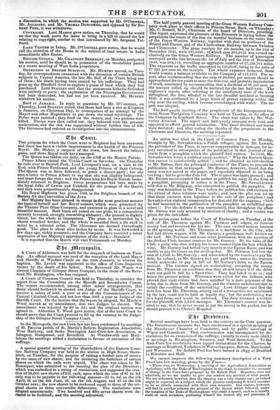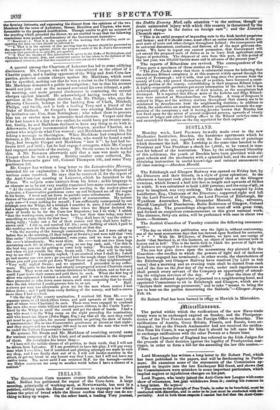'be Vrobintes.
Several meetings have been held in the country on the Corn question. The Government measure has been condemned at a special meeting of the Manchester Chamber of Commerce, and by public meetings at Wigan and Gateshead. That condemnation was accompanied by de- clarations for an extension of the suffrage, (mostly to every male adult,) at meetings in Birmingham, Swansea, and West Bromwich. To the Anti-Corn-law resolutions were tagged declarations for the Charter, by meetings at Bradford, Yorkshire in Wolverhampton, Bolton, Manchester, and Worcester. Sir Robert Peel has been burned in effigy at Bradford in Wiltshire and Hull.
We cannot improve the following summary description of a Tory Pro-Corn-law meeting, given by the Times- " There was, on Wednesday, a meeting of the Agricultural Association at Aylesbury, with the Duke of Buckingham in the chair, to consider the measure of change in the Corn-laws proposed by Sir Robert Peel. Reporters were not admitted, so we are unable to give our readers any account of what passed. We are informed, however, that the meeting was a very stormy one ; as indeed might be expected on a subject which the persons composing it would consider to be so closely connected with their own interests. Our readers, however, will find in another column the account of the dinner which followed, under the auspices of the Duke of Buckingham; who made a speech, such as is usually made on such occasions, professing himself the firmest ally and protector of the farming interests, and expressing his dissent from the opinions of the two Members for the town of Aylesbury, Messrs. Hamilton and Clayton, who were favourable to the proposed modification. Though unable to give an account of the meeting which preceded the dinner, we are enabled to say that the following resolutions were passed, condemnatory of the Government measure- ... Resolved—I. That it is the opinion of this meeting that the sliding scale re- specting the duty on corn should be adhered to.
2. That it is the opinion of this meeting that the farmer should be protected to the amount of 60s. per quarter, whilst the proposed scale of Sir R. Peel's Government extends that protection to only 56s. per quarter.
•• • 3. That the thanks of this Association be given to the Puke of Buckingham and Chandos for the manly, firm, and consistent course he has taken in the defence of the agricultural interest ; and that this resolution Le entered on the minutes.' "
A quarrel among the Chartists of Leicester has led to some edifying disclosures. Mr. Cooper, who will be remembered as the editor of a Chartist paper, and a leading opponent of the Whig and Anti-Corn-law parties, preferred certain charges against Mr. Markham, which need not be specified, making out that he was a traitor to the Chartist cause. Mr. Markham demanded a public investigation ; but in that his accuser
-would not join ; and so the accused convened his own tribunal, a pub- lic meeting, and made general disclosures in combating the several
charges against himself. He acknowledged having received 5L for
services at the Nottingham election, from Mr. Philips ; who, says the .Morning Chronicle, belongs to the banking firm of Clark, Mitchell,
Philips, and Smith, and is both a leading Tory and a friend of the Duke of Rutland. At Cooper's house one evening Markham met by invitation one Cox, from Nottingham ; who asked them to procure him ten or twelve men to personate dead electors. Cooper said that if be had known it a day or two earlier, he could have got twenty men ; but, finally, he and Markham declined to have any thing to do with it. Afterwards, Cooper recommended Skevington, another Chartist, as a person who might do what Cox wanted ; and Markham received 10s. for taking a message to Skevington. When Markham had completed his defence, a Mr. Barrett declared that Swain, who would be found a rank Tory, had brought Cooper and Markham " into it ": he had had be- tween 2001. and 3001. ; but he had engaged strangers, while Mr. Cooper bad engaged members of the society. Mr. Swain seems to have denied this. A Mr. Bowman afterwards said that a sum was made up for Cooper when he took a press. Besides smaller sums collected, Mr. Thomas Duncombe gave 101., Colonel Thompson 10/., and some Tory gentlemen 251.
Mr. Cooper has written a long letter to the Leicestershire Mercury, intended for an explanation ; in which he accounts for the disposal of -various sums received. He says that he received 51. for the report of the Anti-Corn-law meeting at Leicester, which he furnished to the Times. We subjoin some extracts from his letter ; as his language is so obscure as to be not very readily translated into more concise terms- " At the conclusion of an Anti-Corn-law meeting in the market-place of Leicester, a Conservative gentleman came up and beckoned me off the wagon to his house. I went and sat down to partake some refreshment. That gen- tleman of his own accord hinted at the subject of remuneration. My instant reply was—' I want nothing for myself ; I am sufficiently recompensed by our triumph over the Whigs, for a triumph I consider it, since I feel confident we bad a majority twice out of the three times when the Mayor declared the show of hands to be for the Corn-law Repealers ; but I do wish,' I added,
• that the working-men, many of whom have lost their time today, may have
something to repay them for that loss.' They shall have it,' was the unhesi- tating reply; make out a list of their names, and they shall have half-a- crown each' : I did so, and received 121. 108.; every farthing of which I paid to the working-men for the services they rendered on that day. " On the morning of the borough nomination, Swain and I were called up before five in the morning, (I then lodged at Swain's,) and were told that 'two blue cocks' [Conservative candidates] were come, and we were to go up to Mr. —'a immediately. We went there. Mr. — took out two linen bags containing each 101. in silver; and giving us one bag each, said, 'Use this in the best way you can for getting us some help today.' We took the money, and when we got outside the door, Swain said, ' Now, what will be the best way to use this?' I instantly replied, I am resolved what I shall do; I shall go and muster our own men ; go you and hire the rough chaps (not Chartists) whom you said you could get down Wharf Street and in that neighbourhood.' • Very well,' replied Swain; and we separated. 1 proceeded to my coffee- room. The noise in the town had already congregated several Chartists round the door. They went out in various directions to fetch others, and as fast as I could I put down their names and paid them 5s. each. When the first bag of silver was exhausted I fetched a second, and paid it out in the same way. I then proceeded to take down more names, each man consenting that he would take the risk whether I could procure him 5s. or not. * * Half- a-crown per man was afterwards given me for the men whose names I had taken down; and I paid them every farthing of the money, and half-a-crown more than lhad received.
" On the day of the county nomination, I received 501. from Mr. — in separate sums, at (I think)three times, and paid upwards of 330 men (only part of whom were Chartists) 3s. each. These men were engaged to confront the men who wore white billycot hats and green ribbons, in the Castle Yard— hired by the Whigs to swell the crowd and get the show of hands. I bad a spy who went i'.to the Whig camp on the night preceding the nomination, and who beard the Mayor (John Biggs, Esq.) say that all the men they could get must be got together, for success depended on getting the show of hands. I communicated this to two Conservative gentlemen at eleven:at that night ; and they empowered me to engage 300 men to act with the men who were to be under the distinct Conservative banner."
He accuses Mr. Swain and Mr. Markham of receiving several sums for various purposes of a like kind, and of maleversation in the disposal of them. He concludes his letter thus-
" I here tell the middle classes of all politics, to their teeth, that I will not be driven from Leicester. If I am permitted to have fair play, I will pay every man what I owe him ; but if combined and plotting attempts are made to ruin any shop, and I am finally shut out of it, I will sell lucifer-matches in the street, or get my bread in any honest way that I can, but I will not leave my native town. No, never until I am returned M.P. for the borough—unless my Maker summons me away to another world before I have a chance of a contest."



























 Previous page
Previous page